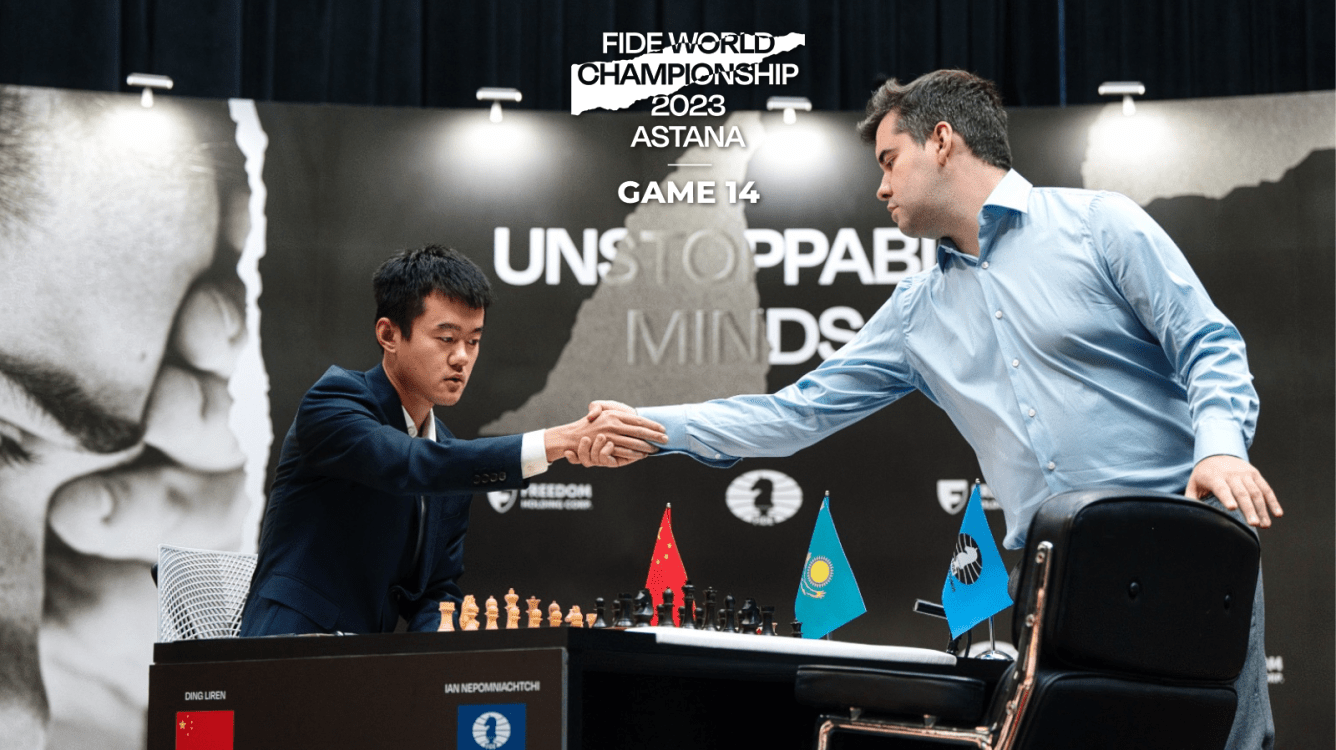
Ding Saves Game 14; Tiebreaks Will Decide World Championship
GM Ding Liren pulled off a clutch 90-move escape to stop GM Ian Nepomniachtchi from winning the 2023 FIDE World Championship after his opening with White unraveled in the 14th game. With the scores locked at 7-7, the contenders will face off in the fifth tiebreak of world championship history, beginning with four rapid games on Sunday, followed by blitz games if the match is still tied.
The winner will be crowned the world champion and take home the €1.1m first prize (the runner-up will receive €900k, 45% of the total prize fund due to a drawn match).
The match will reach its conclusion on Sunday, April 30, at 15:00 Astana time (2 a.m. PT/11:00 CEST).
The live broadcast was hosted by GMs Fabiano Caruana, Robert Hess, and IM Tania Sachdev.
Former world champion GM Vladimir Kramnik once said that "time is precious when you don't have enough of it," and while this was a reference to time spent over the board, it undoubtedly would have applied for the two contenders as time zipped by on their final rest day leading into game 14. With both players within striking range of the title, the biggest question became whether to play for a win or a draw...
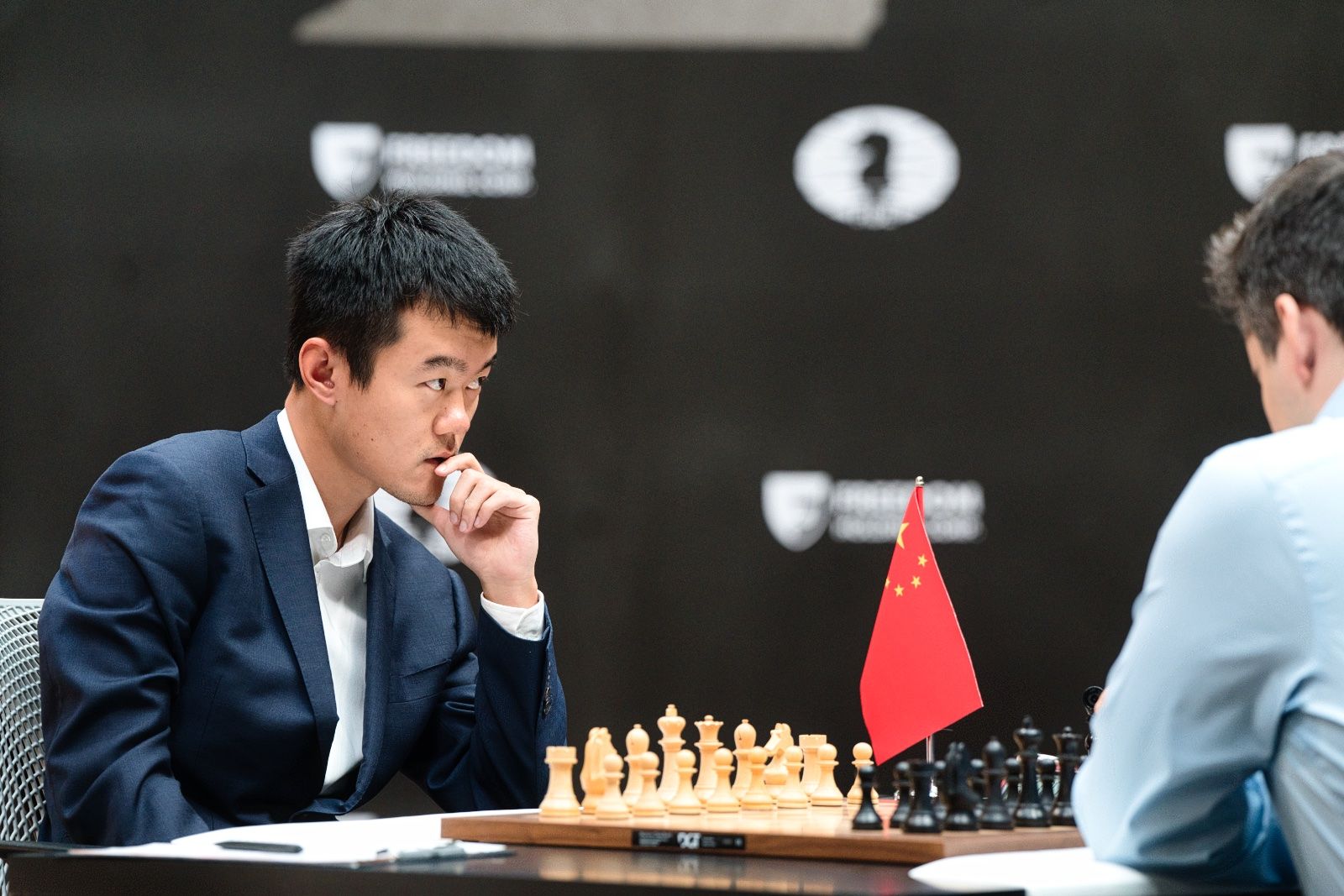
Chess.com's Director of News and Events Peter Doggers made the interesting revelation that scores have been equal with one game remaining just eight times in the history of world championships. Of those, just two ended decisively: Karpov-Korchnoi in 1978 and Anand-Topalov in 2010, the former of which did not follow a fixed-game format, indicating players' preferences to play conservatively in deciding games.
Eight times before in world chess championship history the score was equal with one game to go. Only twice, there was a decisive game in this situation:
— Peter Doggers (@peterdoggers) April 29, 2023
- Karpov won game 32 in 1978
vs Korchnoi;
- Anand won game 12 in 2010 vs. Topalov.#NepoDing pic.twitter.com/7ewAN1GMIp
Arriving at the board looking well-rested, the players took their seats, their destinies now solely in their own hands. Ding began the game with 1.d4, matching up with the popular fan prediction that the London System would be his weapon of choice. It wasn't to be, though, and on move three it was determined that the Nimzo-Indian would be the battleground for the game.
Opening surprises have been central to Ding's strategy in the match, so it was little surprise that the Chinese GM chose to play the sixth most popular move, 5.Bd2, once again testing Nepomniachtchi's ability to adapt.
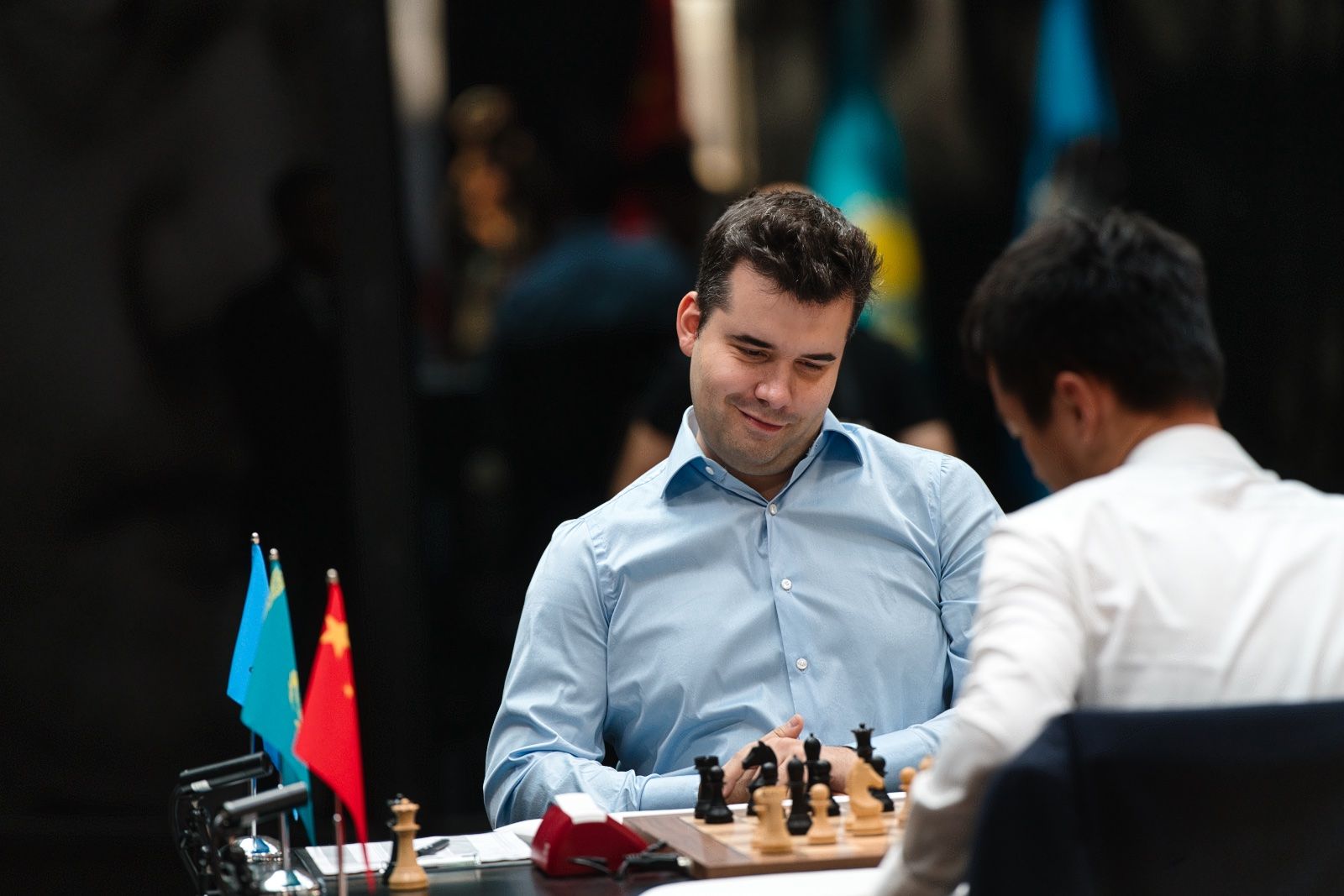
Nepomniachtchi's response with Black was, for the most part, solid. A slight inaccuracy, 11...Be7?, did prevent him from reaching full equality; however, with a symmetrical pawn structure, Ding's best possible reply, 12.e4, wouldn't have garnered any significant advantage.
With the stage set for a high-level draw to transpire, Ding shocked the chess world with 12.Ng5?, a move that would set in motion a spectacle that would draw in over 100,000 concurrent viewers on Chess.com's Youtube commentary. Ding would later comment on the move, stating: "I was very, very optimistic after 12.Ng5 and excited, but then I realized after Qc7 I have to go to a different mood. It was the turning point of the game."
Caruana immediately expressed that the idea behind Ding's move was to sacrifice his knight if it were to be threatened and gave insight into his mindset: "Ding has seen, in his mind, him sacrificing pieces and becoming the world champion" and "He wants to win. This opening is a fighting choice."
Nepomniachtchi's counterattack was world-class and he quickly shut down any chance of Ding's attack paying dividends. 13...Qc7 was so good, in fact, that it sent Ding into a think that lasted more than 20 minutes!
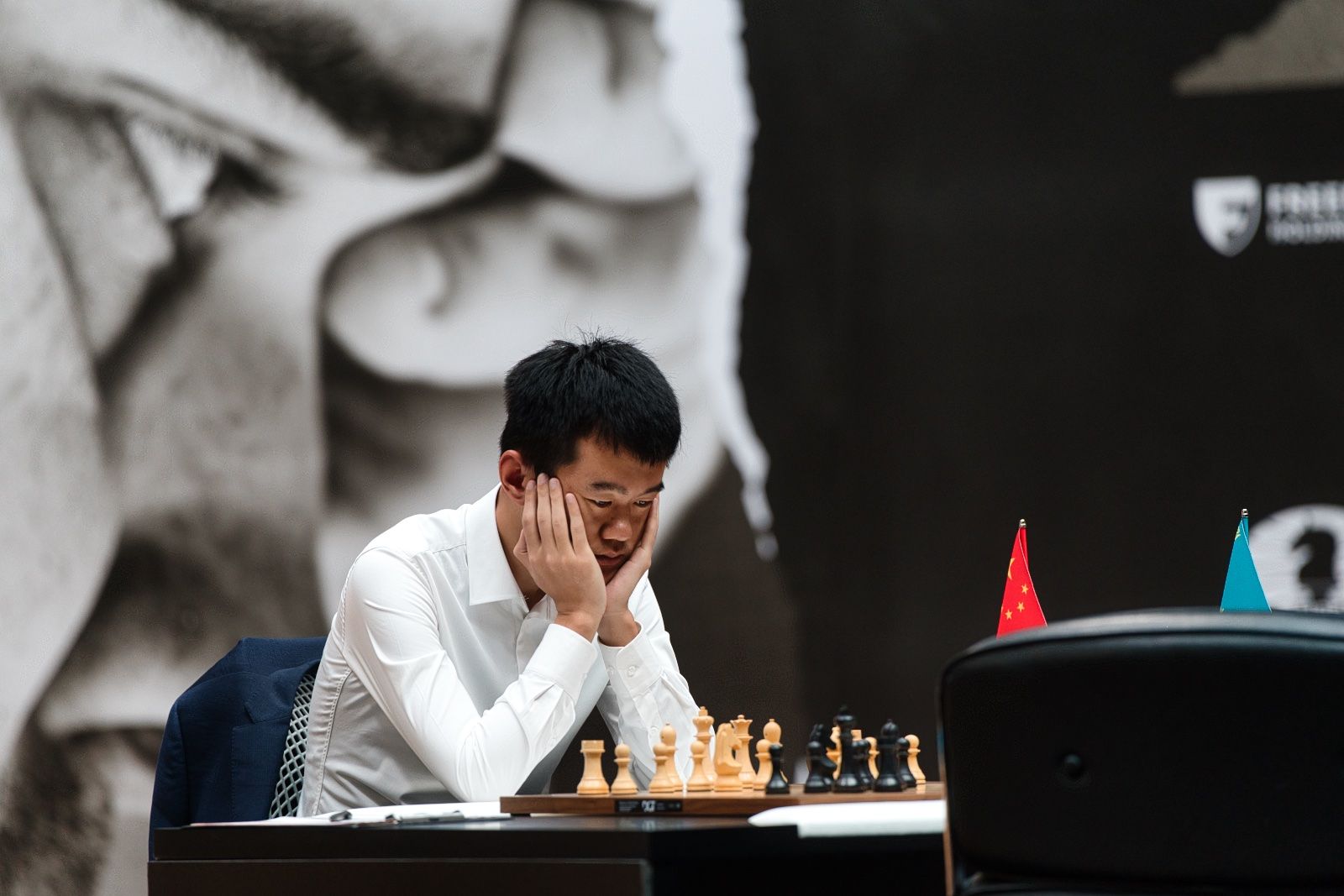
The clock has been one of Ding's worst enemies in the world championship and in game 14 his long thinks once again turned heads. While many were skeptical about his follow-up plan after the ambitious knight move, GM Susan Polgar felt that "the position is not a problem" and that the real concern was the clock.
I am very concerned about Ding’s clock! 🫣 #NepoDing #WorldChessChampionship The position is not a problem. The clock is! pic.twitter.com/CHAFQnqI76
— Susan Polgar (@SusanPolgar) April 29, 2023
Finally, after 20 minutes of calculation, Ding played 14.Be2, a retreat, confessing that he was both out of his preparation and finishing his attack prematurely. Nepomniachtchi, who had spent much of the period confidently pacing around the playing hall, now possessed a 30-minute time advantage.
Smelling blood in the water, Nepomniachtchi began the arduous task of maintaining his advantage and building pressure, utilizing a lack of coordination in the white camp that gave him free reign over the position.
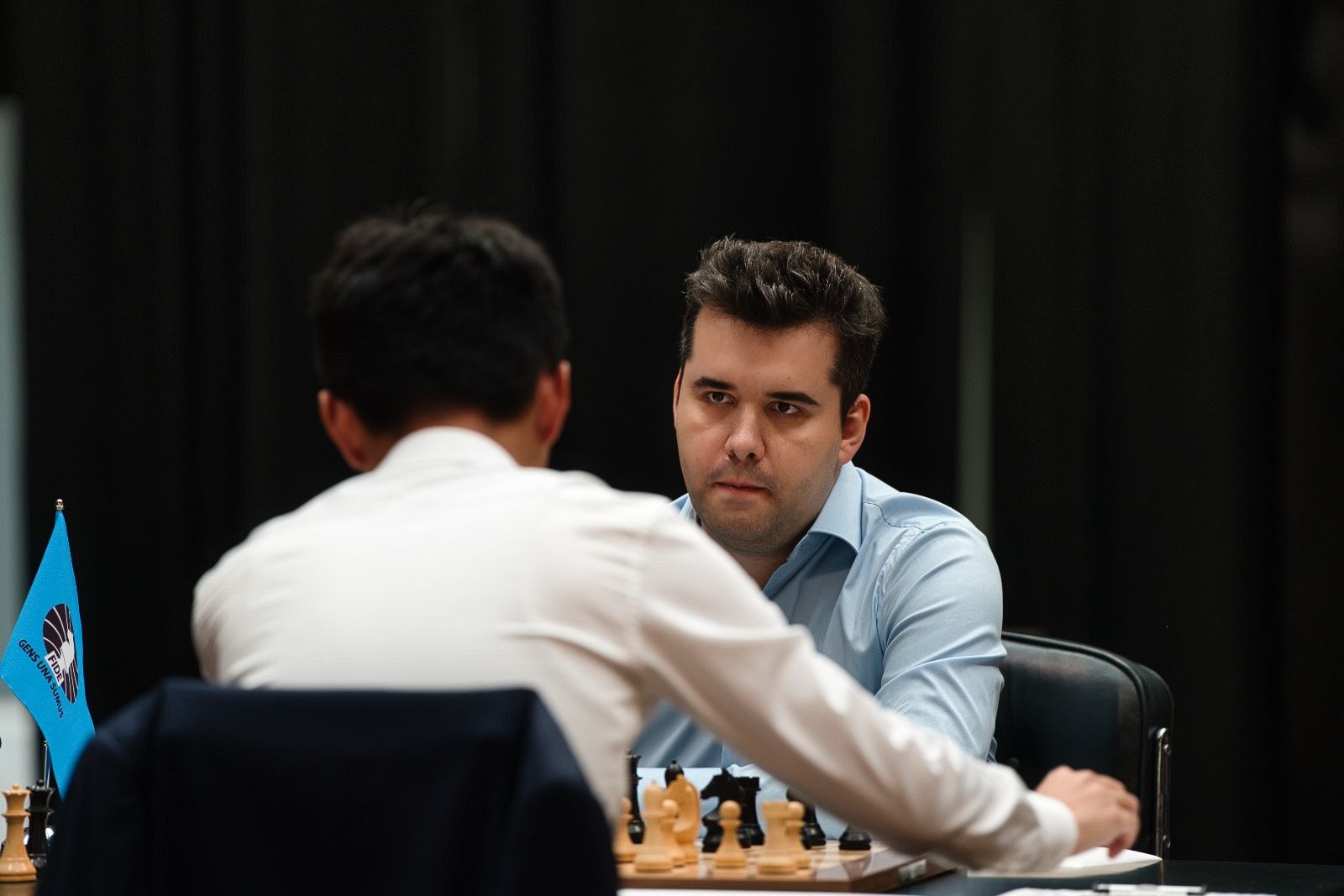
Ding continued to play actively but the thought of "not being the world champion," as he would later admit, did cross his mind as the evaluation bar teetered on the point of no return for White. A pawn sacrifice for activity was his only solace in the position, and despite the risky nature of the move, it did make a draw look more likely.
While Ding did manage to win the pawn back, Nepomniachtchi continued to ask questions of White, and eventually, Ding was faced with another critical moment that arose after Nepomniachtchi played 29...Nd7. A slightly inaccurate response from Ding may have ended up being his saving grace as Black quickly played 30...Nxc5? instead of the patient 30.g6!. Although he thought that "30...Nxc5 was close to winning," Nepomniachtchi would later state: "Probably I should have spent more time."
Despite the scare, Ding was not out of the woods yet and had to face several more nail-biting moments. The closest he came to losing was after 34.Ke2?, but what stood out even more was the stunning way in which Ding was able to liquidate into a drawn endgame. See if you can figure out how the world's best hold below!
After Ding found the dissolving moves, Caruana excitedly remarked: "Playoffs incoming." However, the commentator's curse was to be his downfall as the game was not even half-over move-wise. The endgame would eventually take 50 more moves to reach its conclusion and Ding was forced to play with absolute precision in order to hold.
GM Rafael Leitao's game 14 annotations, including an in-depth look into the technical endgame, are added below.

A fitting end to the magnificent classical part of the match. The games had many mistakes, this is true, but both players went for the win in every game, they gave their hearts and won many fans around the world during this duel. To me it's a pity that all this will come to an end with rapid games, but I suppose there's no better way to decide the winner. I'm sure tomorrow will be full of thrillers and I want to say thanks and good luck to both players.
After 90 moves and six hours and 32 minutes of play, it will be fascinating to see the toll that the grueling 14th game has had on the players. By the time the game finished at around 10 p.m. local time in Astana, the players had just a 17-hour turnaround before their scheduled tiebreaks. Both players expressed that they would choose rest over preparation overnight.

At the conclusion of the press conference, the drawing of lots took place, with Ding drawing the white pieces for the first rapid game. The tiebreak rules were also outlined by the chief arbiter IA Nebjosa Baralic and have been posted below.
Tiebreak Rules
If the match is still tied after the 14th game, the following tiebreakers decide the champion, in order:
- A four-game rapid playoff with a 25+10 time control. A drawing of lots decides which player starts with White.
- If the tie persists, the players contest a two-game playoff with a 5+3 time control. A drawing of lots decides which player starts with White.
- If the tie persists, players contest another two-game playoff with a 5+3 time control. A drawing of lots once more decides which player starts with White.
- If still tied, players play 3+2 games until there is a winner. A drawing of lots once more decides who starts with White, with colors alternating after each game.
The only thing certain in this championship now is the fact that a new world champion will be crowned after Sunday's tiebreaks. While Ding is the world number-two (behind GM Magnus Carlsen) in rapid chess, he is not within the top 100 players in the world in the blitz time control and revealed that he plays "very little" online blitz.
Nepomniachtchi, on the other hand, has been extremely active in both time controls and has won two silver medals in the world rapid championship (2013 and 2015) and one silver medal in the 2014 world blitz championship.
This World Championship is gonna cause heart attacks
— GothamChess (@GothamChess) April 29, 2023
Sunday's tiebreak has the potential to break chess viewership records and is a finale not to be missed. Either player would be a deserving champion at this point, but there can only be one winner. In the words of the first official world champion Wilhelm Steinitz: "Chess is not for timid souls."
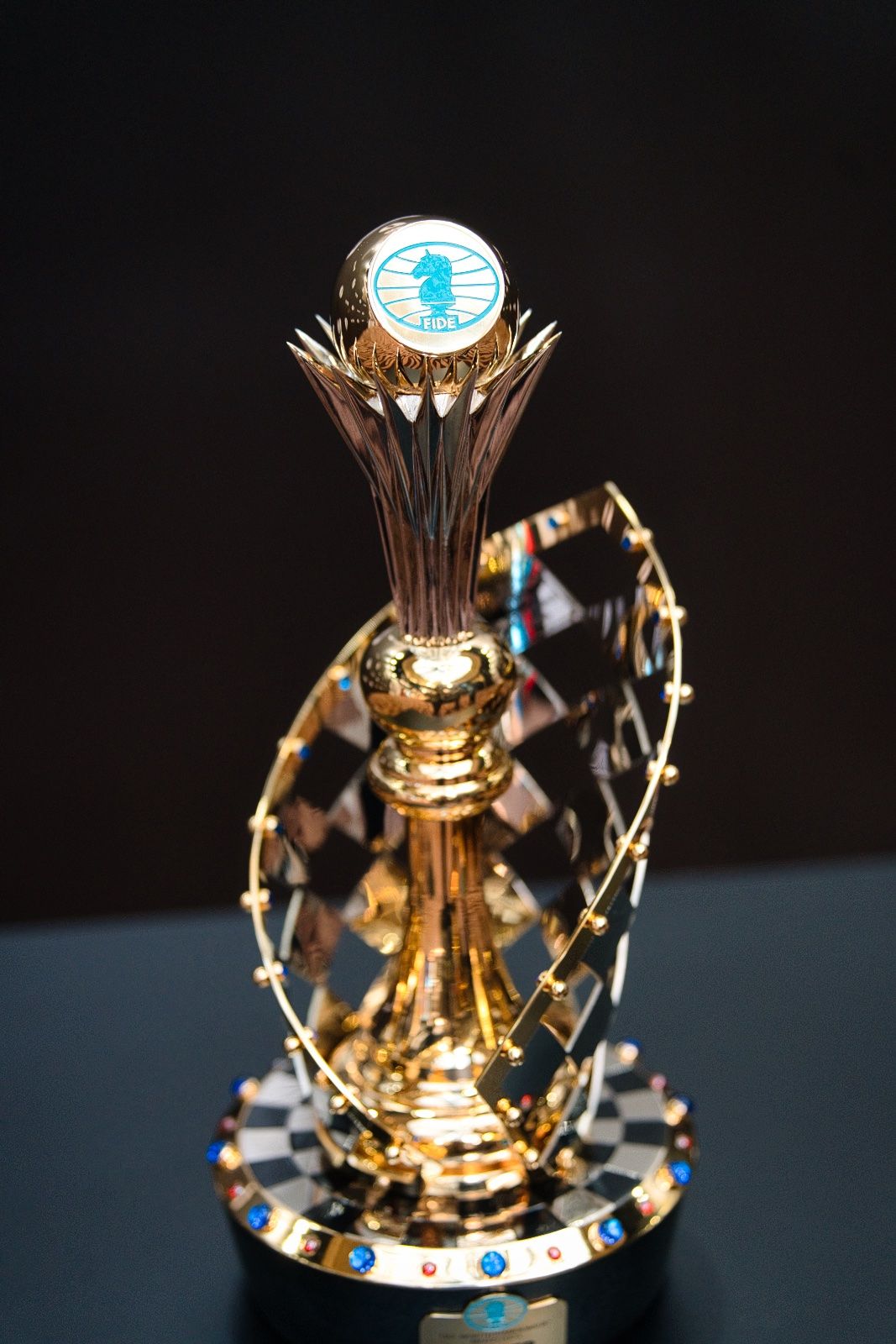
You can watch video recaps of the FIDE World Championship in our playlist below (click here).
Match Score
| Fed | Name | Rtg | 1 | 2 | 3 | 4 | 5 | 6 | 7 | 8 | 9 | 10 | 11 | 12 | 13 | 14 | Score |
| Ding Liren | 2788 | ½ | 0 | ½ | 1 | 0 | 1 | 0 | ½ | ½ | ½ | ½ | 1 | ½ | ½ | 7 | |
| Ian Nepomniachtchi | 2795 | ½ | 1 | ½ | 0 | 1 | 0 | 1 | ½ | ½ | ½ | ½ | 0 | ½ | ½ | 7 |
The 2023 FIDE World Championship is the most important over-the-board classical event of the year and decides who will be the next world champion. Nepomniachtchi and Ding play a match to decide who takes over Carlsen's throne after the current world champion abdicated his title. The match has a €2 million prize fund and is played over 14 classical games; the first player to gain 7.5 points wins.
Previous Coverage
-
-
-
- Nepomniachtchi Stabilizes With Draw, Ding To Play White In Final Classical Game
- Ding Topples Nepomniachtchi In Chaotic Game 12, Evens Score With 2 Games Left
- Pressure Mounts On Ding After 4th Straight Draw
- Nepomniachtchi Holds Ding To Draw, Closes In On World Championship Title
- Nepomniachtchi Inches Closer To World Championship Title After 82-Move Draw
- Nepomniachtchi Miraculously Holds After Beatdown By Ding
- Nepomniachtchi Wins After Ding's Time Pressure Collapse, Takes Lead Again
- Ding Finds Mating Net In Game 6, Ties Match Score Again
- Nepomniachtchi Breaks Away Again, Outplays Ding In Game 5
- Confident Ding Wins Game 4, Levels Match Score
- Ding Holds Nepomniachtchi To Draw In Game 3
- Nepomniachtchi Wins Game 2 With Black After Navigating Ding's Novelty
- Nepomniachtchi Presses Big Advantage In Game 1, Ding Escapes
- All The World Chess Champions
- Meet The Challenger: Ding Liren
- 5 Most Memorable Games Between Ian Nepomniachtchi, Ding Liren
- FIDE World Championship 2023: All The Information
-
-

